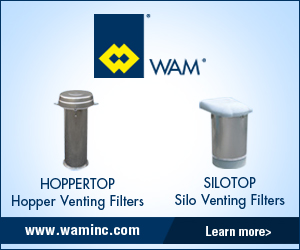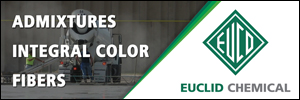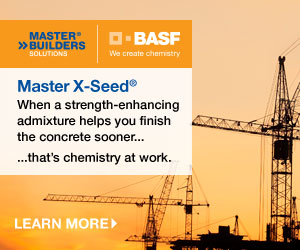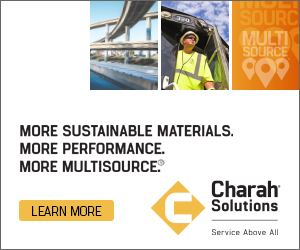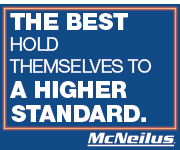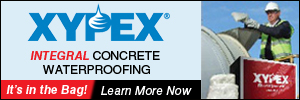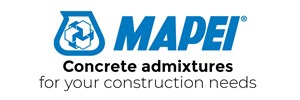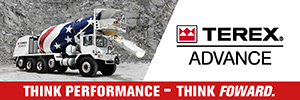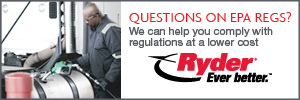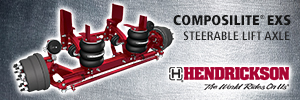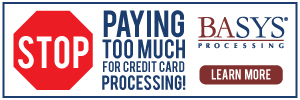 |
||||||||||||
|
||||||||||||
|
Association & Industry News
Please note that E-NEWS will not publish the week of December 23. The next E-NEWS will be sent on Thursday, January 2, 2020. NRMCA President Michael Philipps, Chief Operating Officer Nicole Maher and the staff wish you and your family a happy and healthy holiday season and New Year. NRMCA is seeking nominations for the NRMCA Promoter of the Year – Pavements Award, Promoter of the Year – Buildings Award, State Affiliate Promoter of the Year Award and the John Roberts Lifetime Achievement Award for Promotion. These awards will be presented at NRMCA’s 2020 Annual Convention, March 7-9 in Las Vegas, NV. Nominees for the Promoter of the Year award must be current employees of NRMCA Producer members; nominees for the State Affiliate award must be employees of the affiliate and have worked in the industry for at least five years; nominees for the John Roberts Lifetime Achievement Award must be former employees of NRMCA member companies who are retired or deceased. You can help industry promotion champions get deserved recognition by nominating them for these prestigious awards. The most recent award winners are Duane Coy, Dolese Bros., Inc. (Promoter of the Year – Pavements); Oliver Brooks, Martin Marietta Metro Ready Mix (Promoter of the Year – Buildings); Joel Waters, Mississippi Concrete Association (State Affiliate Promoter of the Year) and Larry Gibbes (John Roberts Lifetime Achievement Award). Please submit a nomination of no more than two pages, detailing a nominee’s exceptional promotional efforts over the last five years or longer in some, or all, of the following performance categories: • Conversions to concrete resulting from promotional activities; • Promotional presentations to specifiers, developers, potential end-users, concrete industry personnel or other individuals or groups; • Professional development support of other ready mix promoters through leadership activities; • Involvement in local, state and national trade association promotional activities; and • Educating potential markets about advanced and innovative concrete technologies. The deadline for submitting nominations is January 17, 2020. Click here to access more information and nomination forms. Questions can be directed to Phil Kresge at 215-779-7375 or by e-mail at pkresge@nrmca.org. If you regularly shop on Amazon, you have an opportunity to also support the RMC Research & Education Foundation at the same time. Amazon has a program called AmazonSmile that donates 0.5% of the price of eligible AmazonSmile purchases to the Foundation when a buyer selects the RMC Research & Education Foundation as the charity of choice for the program. Buyers must specify a specific charity to ensure the Foundation will receive qualifying donations. Then be sure to always shop from smile.amazon.com. AmazonSmile is the same Amazon many used before: same products, same prices, same service. Please feel free to contact Jennifer LeFevre with any questions.
Engineering
The following is a summary of activity at the ASTM meeting held earlier this month in Houston of Committees C09 on Concrete and C01 on Cement attended by NRMCA staff: C09.20 Concrete Aggregates - Minor revisions were approved to ASTM C136 (sieve analysis), C70 (aggregate moisture), C566 (total moisture content of aggregates), C40 (organic impurities), C123 (lightweight particles in aggregate) and C131 (abrasion resistance). A proposal is being developed to remove the weathering map in ASTM C33 (specification for aggregates) that will impact requirements for coarse aggregates. Data was presented on evaluating carbonate based mineral fillers (ASTM C1797) for sulfate resistance with an intent to include testing requirements in the specification. Minor revisions were approved to ASTM C638 and C637 – standards for heavyweight aggregates for concrete for radiation shielding. C09.24 Supplementary Cementitious Materials - A new specification for ground glass pozzolan was approved. Glass from glass containers, windows and auto windshields and from glass fiber reinforcement, crushed to fine particle size can be used as a pozzolanic ingredient in concrete. There are different classifications of ground glass depending on source. For testing pozzolans, a variation of strength activity index (SAI) that will evaluate strength contribution due to water reduction and chemical reactivity is being evaluated and could become a test method. Other measures of pozzolanic activity continue to be researched; these include measures of chemically-bound water; heat of hydration based on calorimetry; calcium hydroxide consumption and a lime-based strength reactivity index test. The first two measures have been balloted. A proposal to include crushed bottom ash (from coal burning) is proposed as an addition to the specification for fly ash and natural pozzolans, ASTM C618. A note in C618 will clarify that high loss on ignition of natural pozzolan is not associated with carbon that causes air entrainment problems as it does for some fly ash. It is also recognized that some natural pozzolans have a higher water requirement and could be approved for use provided performance is not impaired. Other revisions in progress at the subcommittee level include: use of fly ash that could include blended fly ash or blends of fly ash with harvested fly ash; developing a performance-based specification for SCM for use in concrete and specification for colloidal silica as a SCM for use in concrete. A draft specification for natural pozzolan is being developed with the possibility that this will be separated from ASTM C618 which will be limited to coal-combustion byproducts. ASTM C618 could include crushed bottom ash and harvested ash. With these developments, it is recognized that there is an increased need for SCMs for use in concrete while the specifications should ensure that they prevent inert materials that do not provide cementitious benefits from being qualified. C09.40 Ready Mixed Concrete - The subcommittee addressed negatives on the proposal to replace the 90-minute time limit for delivery to be replaced by limit set by the producer or purchaser that would be applicable to project conditions or the type of mixture. The passage of this proposal was not successful in deliberations at the main committee. A revision to C94 was approved to clarify qualifications of laboratory technicians. Other work in progress is to require a retest when tests fail slump and air content to include a reference to the specification for mineral fillers, C1797 and blended SCMs, C1697, in C94; address scheduling and performance-based orders in the ordering section and to including a requirement to state the allowable water that can be added at the jobsite on the delivery ticket. C09.50 Risk Management for Alkali Aggregate Reactions (AAR) - Several proposals are in progress: evaluating efficacy of SCMs with a high alkali content with a 2-year concrete prism test (C1293). This would not apply to natural pozzolans; rather to clarify the flowchart in ASTM C1778 (practice for AAR) and to better define the conditioning period before measurements are made on specimens in C1293. Guidance on interpretation of results in the appendices of ASTM C1567, C1260 and C1293 will be removed to be replaced with reference to C1778. The subcommittee was offered a presentation to evaluate leaching of alkalis in the C1293 concrete prism test. Promising approaches included using cylinders instead of prisms; using of larger specimens and using an inverted plastic bag over the top 2/3rd of the specimen. Reducing leaching could change to scope of the test method by removing the requirement to add additional alkalis to the mixture to potentially evaluate cement at different alkali contents. C09.60 Fresh Concrete Tests - A new standard for using K-slump tester to measure workability was approved (this was previously ASTM C1362). A proposed revision to consolidating concrete in the slump cone received several negatives and was withdrawn. A new method for measuring the electrical resistance of fresh concrete is still in the works. The subcommittee received a presentation of a prototype device that is inserted in fresh concrete to measure air content and specific surface (as a measure of the air void system). The device is referred to as the shock wave air meter (SWAM) and has shown reasonable correlation to air void system in hardened concrete in evaluations at Georgia Tech. C09.61 Strength - Revisions are being considered to include the sample ID and delivery ticket number on the report for making cylinders, ASTM C31, and the strength test report, C39. Minor revisions were approved to ASTM C31 (making and curing test specimens and C39 (testing strength), and C192. Revisions to C31 on improved language for initial curing in the field are in the works. The subcommittee is finalizing a precision statement for ASTM C469 - measuring the modulus of elasticity of concrete based on results of a recently completed inter-laboratory study (ILS). C09.66 Fluid Penetration - The subcommittee will ballot to withdraw ASTM C1760 (bulk conductivity) and ASTM C642 (hardened concrete voids by boiling) test methods. The newer standard C1876 (bulk resistivity) is a replacement that provides similar information to C1760. ASTM C642 is being withdrawn because of the uncertainty of the property it measures and its high variability. Some changes are being developed to C1876: 1. A procedure to standardize the readings of the equipment before the test; 2. Clarify that specimens are to be immersed in lime-saturated simulated pore solution when demolded at 1 day; 3. Include an option for accelerated curing of test specimens (similar to ASTM C1202); and 4. Establish a time limit for taking resistivity readings after specimens are removed from the solution. Conditioning test specimens in lime water will be considered when more data is available. A revision to ASTM C1202 (rapid chloride permeability) to address a correction to the result for the specimen thickness was discussed. The subcommittee is planning interlaboratory studies to develop precision estimates for ASTM C1876, C1202 and C1556 (diffusion coefficient). NRMCA is involved in these efforts and will be a participating laboratory. The subcommittee received a presentation regarding simplifying specimen conditioning in ASTM C1585 (sorptivity of concrete). These changes could improve the correlation between initial sorptivity and other parameters such as resistivity and w/cm. ASTM C09.67 Resistance to Environment - The subcommittee is planning an interlaboratory study to develop a precision statement for ASTM C666 – testing the freezing and thawing resistance of concrete. C01.10 Hydraulic Cement - Revisions to cement standards are coordinated to ensure consistency between ASTM and AASHTO specifications for hydraulic cement. With the removal of a low alkali option in ASTM C150 for portland cement, efforts are ongoing to educate specifiers on this change. As part of this effort, a database of state highway agency specifications related to requirements for cement and alkali aggregate reactions has been developed. A revision was approved to ASTM C595 (blended cement) to report the chloride content, if requested. A revision to ASTM C1157 (performance spec for cement) to revise the heat of hydration limits to be based on isothermal calorimetry – these changes were previously approved to the other cement specifications. For more information, contact Colin Lobo at clobo@nrmca.org.
Buildings
Build With Strength (BWS) recently met with New Jersey lawmakers and stakeholders in an effort to help pass legislation aimed at establishing safer building practices, reports NRMCA Senior Vice President, State and Local Government Affairs, John Loyer. Lawmakers, State Senator Linda Greenstein (D-14), Mercer County Freeholder Lucy Walter and Rich Tolson of the Bricklayers and Allied Craftworkers of New Jersey, participated in a panel discussion at Rowan College of Burlington County. They discussed Assembly Bill 135 and Senate Bill 1261 that would amend New Jersey’s construction code for fire safety reasons and provide an added level of protection for firefighters and residents alike. “With this legislation, we have an opportunity to significantly impact the safety of future residents through out New Jersey,” said Senator Greenstein, a co-sponsor of the Senate version of the legislation. “As the Chair of the Law and Public Safety Committee, I view this as a priority and look forward to continued work with my colleagues in the Legislature to address such an important issue. With midrise residential housing becoming increasingly popular in our state, it is important that we are building it safely and responsibly.” New Jersey has been subject to high-profile fires in recent years due to the use of lightweight wood construction materials. Both the Avalon at Edgewater and Highland Park fires were among the largest and drove communities to take action on the ways in which these buildings are structured. “About a year ago, Mercer County adopted a resolution in support of this legislation,” said Mercer County Freeholder Lucy Walter. “We stand by that commitment and are hopeful that the Legislature will take the next step for passage.” “We must enact policies that enhance the safety of not only our first responders, but also those that are involved in the construction process,” added Tolson of the Bricklayers and Allied Craftworkers organization. “Too often these fires erupt during the building phase and it is very important to use non-combustible materials to prevent that from happening.” Build With Strength works with communities, lawmakers and industry employees to advocate for safer, sustainable building materials. Strengthening local and national building codes is among the organization’s top priorities. For more information, contact John Loyer at jloyer@nrmca.org. With environmental transparency criteria being discovered in LEED building construction documents and specifications, material suppliers are investing into disclosure reports, specifically environmental product declarations (EPD). As a leading Environmental Product Declaration (EPD) Program Operator for the concrete industry, NRMCA recently verified an EPD by Albuquerque, NM-based Duke City Redi-Mix. The EPD was developed by Athena Sustainable Materials Institute and verified by Sustainable Solutions Corporation. The EPD reports the impacts for 30 different ready mixed concrete products produced at Duke's Albuquerque and Los Lunas, NM, plants. Duke City is the first concrete producer in the market area to achieve EPD verification. To date, the North American ready mixed concrete industry, including material suppliers, have verified almost 60 EPDs with more than 18,000 products/mixes and is the leading material industry that reports environmental impacts. NRMCA-verified EPDs can be found here. Integral to the Build With Strength campaign, NRMCA promotes Strength Through Transparency for member and industry competitiveness in the green building marketplace and the trends toward product and company transparency. For support, training or program development, contact James Bogdan at jbogdan@nrmca.org or 412-420-4138. NRMCA staff recently attended the ASTM E05 Fire Standards Committee Meetings held earlier this month in Houston, including subcommittee meetings E05.11 Fire Resistance, E05.14 External Fire Exposure Tests and Task Group on Tall Wood Buildings, E05.32 Research, E05.33 Fire Safety Engineering and others. The ASTM E05.11 Subcommittee on Fire Resistance discussed and commenced an update of ASTM E119 Standard Test Methods for Fire Test of Building Construction and Materials. The ASTM E05.14 Subcommittee on External Fire Exposure Tests deliberated technical comments received from the recent ballot for the proposed Standard Test Method for Determining Flammability of Exterior Wall Assemblies for Mass Timber Multi-Story Structures. Based on the comments received, the proposed test standard will be balloted again in preparation for the next E05 Committee meeting scheduled for June 2020 in Boston. For more information regarding NRMCA’s participation on the ASTM E05 Fire Standards Committee and other Fire Codes and Standards advocacy efforts, contact Shamim Rashid-Sumar at ssumar@nrmca.org. SEO
The NRMCA Financial Performance Improvement Group is pleased to announce that NRMCA will offer for the first time a course titled Think Like an Owner. It is based on insights gleaned from the Performance Benchmarking Survey and seeks to address the issue of declining profits in a growing market. Participants will learn how to read financial statements, measure performance, examine elements of profit and loss, and think in terms of economic profit. This course is a must-attend for industry participants, from plant managers to company presidents who want to run their operations profitably. Click here to register soon as this course is sure to sell out quickly. Last week, the National Labor Relations Board (NLRB) finalized a long-awaited rule to amend the erroneous Obama Administration’s 2015 rule, commonly known as the “Ambush” or “Quickie” Election Rule. The 2015 rule sought to decrease the amount of time that passed from when an organizing group filed an election petition to when a union election was held, down to as little as 13 days. The rule also limited pre-election questions of unit scope and eligibility of employees, among numerous others. Under the amended rule, employers and organizing groups will have a more balanced and efficient process for managing representation elections. The changes smooth out the most contentious portions of the April 2015 rule, including pre-election hearing timing and scope, post-election hearings and voter lists. Speaking on the rule, board Chairman John F. Ring said, “These are common sense changes to ensure expeditious elections that are fair and efficient. The new procedures will allow workers to be informed of their rights and will simplify the representation process to the benefit of all parties.” The rule’s changes to union election procedures will become effective in April 2020. Click here to review the final rule. For more information, contact Kevin Walgenbach at kwalgenbach@nrmca.org. NRMCA will hold a free Webinar on Wednesday, January 8, 2020 at 11 a.m. Eastern time on how to get started and conduct a mixer driver championship. Hear how to plan for an oversight committee, budget, trucks, insurance, challenge course layout and set up, point system, judges' responsibilities, written exam, types of questions, reference material, visual inspection, truck defects, security and fairness, awards and so much more. Click here for more information and to register. You may also contact Gary Mullings at gmullings@nrmca.org. NRMCA's Ready Mixed Concrete Delivery Professional Driver of the Year Award acknowledges the significant contribution of ready mixed concrete truck drivers to the growth and success of individual companies and the ready mixed concrete industry. As a salute to these key members of the concrete production and delivery team, the award recognizes the driver’s career achievement, safety, professionalism, competence and customer service skills in a manner that will enhance the industry and public image of the career of Ready Mixed Concrete Delivery Professional. The 2020 Ready Mixed Concrete Truck Driver of the Year Award winner will be honored at an awards presentation ceremony at NRMCA’s Annual Convention in Las Vegas, NV, in March. Nomination applications must be e-mailed to Gary Mullings at gmullings@nrmca.org by Tuesday, December 31. Click here to download the nomination form and for more information. Learning & Development
Last week the U.S. Department of Labor announced a Final Rule that will allow employers to more easily offer perks and benefits to their employees. The rule marks the first significant update in more than 50 years to the regulations governing regular rate requirements under the Fair Labor Standards Act (FLSA). Those requirements define what forms of payment employers include and exclude in the FLSA’s “time and one-half” calculation when determining overtime rates.
The final rule also includes additional clarification about other forms of compensation, including payment for meal periods and “call back” pay. It can be viewed here and will take effect 30 days after its publication in the Federal Register. Government Affairs
Last week, the NRMCA Government Affairs team along with Exectuvie Vice President, Structures and Sustainability, Lionel Lemay met with key staffers on the House Science, Space and Technology Committee regarding legislation aimed at promoting technologies that reduce the emissions impact of manufacturing processes. The legislation, the Clean Industrial Technologies Act, provides funding for research in several focus areas, including industrial production processes, cement, alternative materials that produce fewer emissions during production, carbon capture technologies, use of alternative fuels, and opportunities for modeling and simulation to optimize the design of energy efficient and sustainable products. Committee staff also consulted with NRMCA’s Colin Lobo and Karthik Obla on opportunities for adopting performance-based specifications to contribute to lowering emissions. The committee is interested in including a provision that encourages performance-based specifications in its legislation. For more information, contact Andrew Tyrrell at atyrrell@nrmca.org. The Resilient Building Coalition held a meeting last week hosted by the American Institute for Architects and the Urban Land Institute during which participants heard updates from the various member organizations. NRMCA was represented by Lionel Lemay, Tien Peng and Government Affairs staff which briefed attendees on the updates to the Disaster Savings and Resilient Construction Act. The specifics of the legislation generated significant interest and NRMCA expects to be able to partner with multiple organizations and associations in support of this legislation. For more information, contact Andrew Tyrrell at atyrrell@nrmca.org. Congressional appropriators' spending deal for Fiscal Year 2020 included $50 million for the NRMCA-supported Defense Community Infrastructure Program (DCIP). The DCIP is a pilot project funded for the first time to provide grants for infrastructure projects in communities around military bases. This program will fund infrastructure projects without relying on the Highway Trust Fund or Department of Transportation, and can be used for roads, bridges and water infrastructure as well as building police and fire facilities, rural broadband, and schools and hospitals. This was a program advocated by Government Affairs staff and is a significant win for the industry. For more information, contact NRMCA's Andrew Tyrrell at atyrrell@nrmca.org. Working over the weekend, Congressional appropriations committees produced a bicameral agreement on spending for the 2020 Fiscal Year. The $1.4 trillion spending bill funds the government through the end of the fiscal year, preventing a shutdown as December 20 approaches. The appropriations will be considered in two separate “minibuses” and are expected to pass both the House and Senate. The Transportation, Housing and Urban Development (THUD) appropriations increased by $3.2 billion, with the increase dedicated to the Department of Housing and Urban Development (HUD). The Department of Transportation is funded at $86.2 billion; the bill fully funds the FAST Act, provides $1 billion for BUILD (formerly known as TIGER) grants, and includes funding for reviewing and studying transportation resilience metrics. Click here to read more on THUD appropriations. For more information, contact Andrew Tyrrell at atyrrell@nrmca.org. Calendar
*Please note that e-mail and direct links to each event listed below can be accessed from NRMCA's Web site. January 8, Free Webinar January 14 – 16, Nashville, TN January 21 – 24, Cincinnati *Sold Out January 27 – 31, Ontario, CA January 28 – 30, Orlando, FL January 28 – 30, Dallas January 29, Louisville, KY February 6, Omaha, NE February 20, Castle Hayne, NC February 25 – 28, Miami March 7 – 9, Las Vegas March 10 – 14, Las Vegas March 17 – 19, Dallas March 24 – 27, Boston April 28 – May 1, New Orleans September 27 – 29, Aurora, CO December 15 – 18, Phoenix |
||||||||||||
